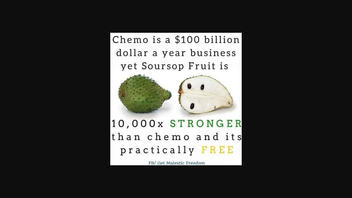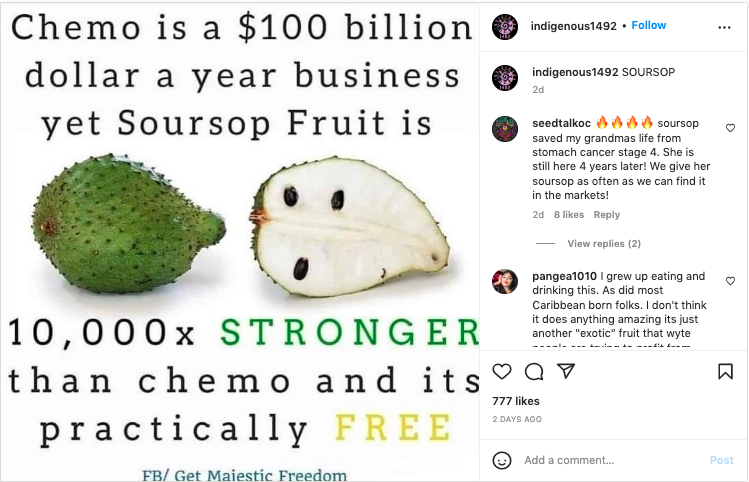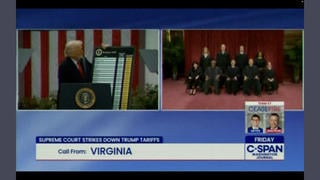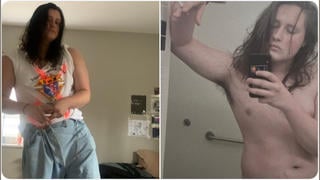
Is soursop fruit 10,000 times stronger than chemotherapy? No, that's not true: Soursop has not been proven in any clinical trials to be stronger than chemotherapy to any degree. According to a cancer professor at Harvard, this is "not a plausible statement and there's nothing to back it up."
The claim appeared in an Instagram post on October 29, 2022. Its text reads:
Chemo Is a $100 billion dollar a year business yet Soursop Fruit is 10,000x STRONGER than chemo and its practically FREE
This is what it looked like at the time of writing:
(Image source: Instagram screenshot taken on Mon Oct 28 17:58:28 2022 UTC)
According to Britannica.com: "soursop has been promoted as an alternative cancer treatment, but clinical studies in humans are lacking."
On the Memorial Sloan Kettering Cancer Center website, there is a listing for graviola (soursop) that says it's used "as an alternative medicine therapy for cancer." But, "there is no proof that this therapy has benefits for cancer patients."
In a phone interview with Lead Stories on November 3, 2022, Dr. Timothy Rebbeck, the Vincent L. Gregory Jr. Professor of Cancer Prevention at the Harvard TH Chan School of Public Health and Professor of Medical Oncology at the Dana-Farber Cancer Institute, said:
Soursop and other foods and things that you hear out there have not gone through any kind of scientific evaluation to see whether they have any effect or not. So, there isn't any evidence. There is no research. There are no studies that would back up a statement like that.
He warned that this "kind of misinformation" is not just "sensationalist."
It's also dangerous to people who have cancer and need to have real treatments. They may not get it because they believe, that because they ate a fruit or a lemon or something, they may be getting just as good care and that will cost them their lives.
He said misinformation like this claim can impact people who are at their most vulnerable.
People are desperate sometimes and they want to believe that there are things that work and there are things that don't work and it's important to rely on facts and data and do it right and that's how lives are saved.
For factual and scientific-based information on cancer, Rebbeck recommends the website Cancer FactFinder. It is headed by a team led by the Zhu Family Center for Global Cancer Prevention at Harvard T.H. Chan School of Public Health and the Center for Cancer Equity and Engagement at the Dana-Farber/Harvard Cancer Center.
The website is updated continuously and provides:
accurate and reliable information about what does and does not cause cancer. For each topic on the website, the team, which includes scientific experts and community members, reviewed and summarized the best scientific, evidence-based information available.
The National Cancer Institute is the federal government's principal agency for cancer research and training and is part of the Department of Health and Human Services. It explains how to find trustworthy "evidence-based information sources" for cancer and other health information.
Lead Stories has many debunks on cancer claims. A few recent examples are here, here and here.

















